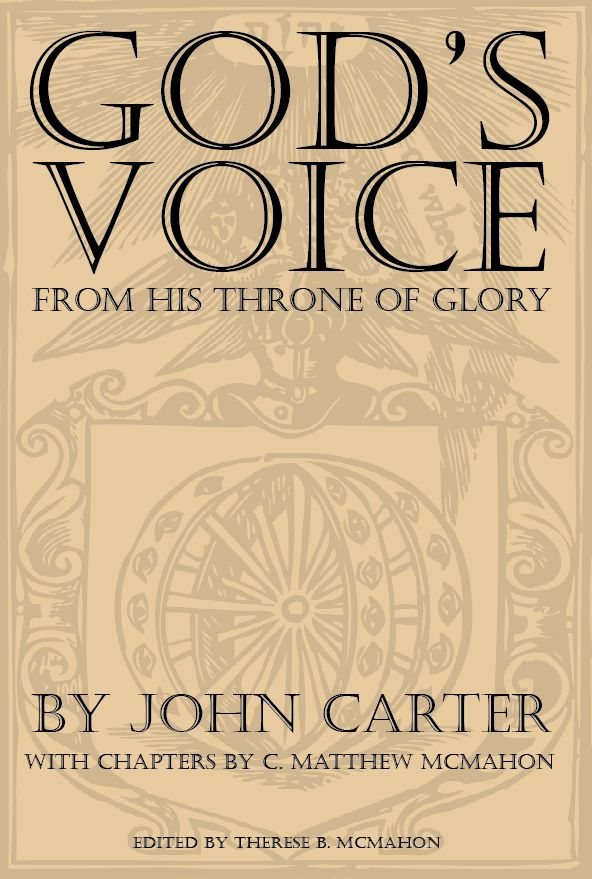John Carter (d. 1655)
An active puritan divine and powerful preacher who wrote on a variety of subjects.“The providence of God disposes all 2nd causes as he pleases and orders all creatures and motions according to his own will.”
His Works:
God’s Voice from His Throne of Glory by John Carter – eBook
Buy the Print Book HERE
The Works of John Carter (d. 1655) available in old English:
a. An Apology in Defence of the Geneva Notes on the Bible (written circa 1612).
b. A Patterne of Pietie, or the Religious life and death of that grave and gracious Matron, Mrs. Jane Ratcliffe, Widow, and Citizen of Chester, 1640.
c. Sunday a Sabbath, or a preparative Discourse for discussion of Sabbatary doubts, 1641.
d. The Christian Sabbath maintained, in Answer to a book of Dr. Pocklington stiled “Sunday no Sabbath.”
e. A Letter against the Erection of an Altar, 1641.
f. A Case of Conscience concerning the Sacrament of the Lord’s Supper, 1641.
g. Defensive Doubts, Hopes and Reasons for Refusall of the Oath imposed by the sixth Canon of the late Synod, 1641.
h. A Comparison of the Parliamentary Prostestation with the late Canonical Oath, 1641.
i. A Discourse concerning Puritans, 1641.
j. A Monitor of Mortality, 1643 (two funeral sermons).
k. Fury of War and Folly of Sin, 1643, a sermon.
l. The New Quere and Determination upon it, by Mr. Saltmarsh … examined, 1646.
m. Apologetical Narrative of the late Petition of the Common Council and Ministers of London, 1646.
n. Light for Smoak, or a cleare and distinct Reply to a dark and confused Answer in a book made and entitled “The Smoke in the Temple” by John Saltmarsh, 1646.
o. An After-reckoning with Mr. Saltmarsh, 1646.
p. Attestation of the Ministers of Cheshire to the Testimony of the Ministers of the Province of London, 1648.
q. Elaborate Annotations on the Pentateuch, 1651.
r. A Learned Defence for the Legaluty of Tithes, Oxford, 1653.
s. General Reasons against the Payment of a fifth part to Sequestered Ministers Wives and Children … whereto are added special Reasons against the Payment of a fifth part to Dr. E. H[yde] out of the Rectory of Brightwell, 1654.
t. Debate concerning the English Liturgy drawn out in two English and two Latin Epistles, written betwixt Edward Hyde and John Ley, 1656.
u. Discourses or Disputations, chiefly concerning matters of Religion, 1658.
v. Animadversions on two printed Books of Joh. Onely, a Lay Preacher.
w. Equitable and Necessary Considerations for the Association of Arms throughout England and Wales.
x. Comparison of the Oath of the Sixth Canon of the last Synod of Bishops and the Protestation set forth by the Parliament, in Answer to a letter of Pedoel Harlow, Gent.
y. Exceptions Many and Just, being an Answer to two injurious Petitions against Tithes.
Biography of John Carter (d. 1655):
John Carter the younger (d. 1655), divine, son of John Carter the elder, born in his father’s parish of Bramford, was admitted to Corpus Christi College, Cambridge, in 1596, proceeded B.A. 1599, and M.A. 1603. He was chosen by the parishioners curate or assistant minister of St. Peter Mancroft, Norwich, in 1631; was appointed one of the four lecturers in 1633 to preach the Tuesday lectures at St. Peter’s according to the order of the assembly; and in 1638 became parish chaplain or head minister, which post he retained for nearly fifteen years. In three sermons, preached before the Norwich corporation, in celebration of the guild festivals of 1644, 1647, and 1650 (see The Nail and the Wheel, 1647; A rare sight, or the Lyon, 1650), he vehemently attacked the magistrates for their weak-kneed devotion to presbyterianism. The violence of his language and his fanatical denunciations of monarchy caused his removal from the ministry, and at the close of 1653 he calls himself ‘preacher of the Gospel, and as yet sojourning in the city of Norwich.’ He was afterwards minister of St. Lawrence, Norwich, and died in that city on 10 Dec. 1655. John Collings, B.D., preached the funeral sermon on 14 Dec. Carter wrote the memoir of his father entitled ‘The Tombstone’ in 1653.
[Davy’s Athenæ Suffolc. i. 393, in Brit. Mus. Addit. MS. 19165; Masters’s Hist. of C.C.C. Camb. p. 264; Blomefield’s Norfolk, iv. 188–9; Brit. Mus. Cat.]




